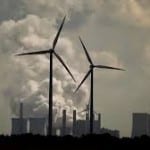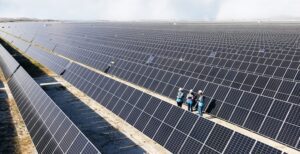The historic Paris climate agreement has left Australia in a conflicted position.
 While today’s historic international climate agreement will boost existing investment trends and herald a move to a zero carbon global economy, it also highlights the glaring inadequacies of Australia’s commitments and policies when compared with the necessary action to be taken and that of other countries.
While today’s historic international climate agreement will boost existing investment trends and herald a move to a zero carbon global economy, it also highlights the glaring inadequacies of Australia’s commitments and policies when compared with the necessary action to be taken and that of other countries.
This Paris agreement, forged by 196 countries, signals to communities, investors and companies around the world that the shift to clean energy is now unstoppable.
The process was always going to be ugly and the agreement is not perfect. But this agreement, and its process of continually ratcheting up action, makes the objective unmistakeably clear. Nations are heading, within a handful of decades, to net zero emissions – an end to adding heat-trapping carbon pollution to our atmosphere.
The government has played a mostly constructive role in Paris. In order to maintain any credibility, it now needs to urgently lift its game on pollution targets, financial support for the world’s most vulnerable countries, Kyoto commitments and, perhaps most importantly, its domestic policies.
The agreement that has come out of the 21st UN Conference of Parties in Paris is historic, not only because all countries have agreed to limit emissions, but also because they have agreed to continually review and strengthen actions every five years, beginning in 2018.
These aspects of the agreement are extremely significant because, up until now, countries had set targets only for single periods of time.
In Paris, Australia’s negotiating team – led by the Prime Minister, Foreign Minister and Environment Minister – supported the need for net zero emissions and joined the ‘high ambition coalition of nations’ which seeks to keep warming below 1.5 degrees, just half a degree from current warming.
However, Australia’s domestic actions now need to match these fine outcomes and aspirations in Paris. Without stronger action, for example, 2030 country commitments will leave Australia as the highest per capita polluter in the G20 alongside just Saudi Arabia, one of the most obstructive forces in the Paris negotiations.
The international politics of climate change are catching up with the real-world, where global investments in clean power already outstrip investments in traditional fossil fuels.
The agreement will further galvanise investors and industry around the growing opportunities of a clean economy, and pile risks on those who cling to old and polluting technologies.
There were four immediate steps the Australian government should take, now that the Paris conference was over:
- Improve our initial post 2020 pollution reduction targets, which are more aligned to 3 to 4oC warming, and would leave us in 2030 with the most pollution intensive economy and the highest per capita pollution in the developed world. If we are serious about helping avoid 1.5°C warming, this should include a commitment to net zero emissions before 2050;
- Expand domestic policies and, in particular, have a plan to phase out existing coal fired power plants which will block modernisation and innovation of our electricity system for decades. Our current initiatives do not put us on a path to meet our current inadequate 2030 pollution reduction target, let alone help meet ever strengthening future targets;
- Increase “climate finance” investment promises to assist vulnerable countries: our current “at least” $1billion to 2020 commitment is well short of our share or those of comparable economies, like Canada, which committed $2.5 billion;
- As an act of goodwill, join other developed countries, like the UK and Germany, in cancelling our “Kyoto carry over” of surplus carbon credits, achieved by bettering 2012 targets, rather than counting it towards 2020 targets.
The Paris agreement marks a critical point for the Australian government’s climate policy. We have agreed to scale up action towards net zero emissions and our major partners are already accelerating down this path. The time for piecemeal, unstable and short-term policy is over. The real work for Australia starts now.
John Connor is CEO of The Climate Institute. This article was adapted from a media statement released on Saturday.






